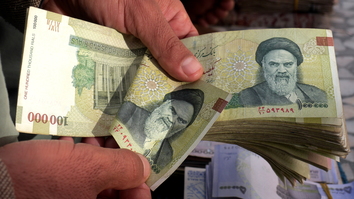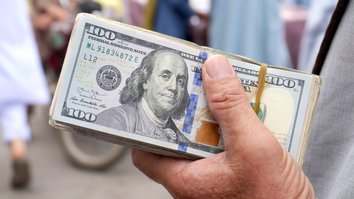KABUL -- Afghan businessmen and economists lambasted the suggestion by Iranian President Ebrahim Raisi that Afghanistan and other countries in the region should use the Iranian rial instead of US dollars for business and trade.
Such a move would further isolate Afghanistan, diminish the value of the afghani, deliver a major blow to the economy and bring additional suffering to Afghans, they say.
Raisi made the proposition April 30 at an event with Iranian traders in Khuzestan province.
"With Iraq, we can use rial, we can do so with Afghanistan and also with some other regional countries," he said, according to TOLOnews. "There are other issues which need to be discussed and which can play an effective and important role."
![An Afghan returnee (right) from Iran counts Iranian banknotes at a currency exchange in Herat province on August 4, 2018. [Hoshang Hashimi/AFP]](/cnmi_st/images/2023/05/04/41985-1879br-highres-585_329.jpg)
An Afghan returnee (right) from Iran counts Iranian banknotes at a currency exchange in Herat province on August 4, 2018. [Hoshang Hashimi/AFP]
The idea is preposterous and detrimental to Afghans, say economic analysts and traders.
In 2022, countries kept more than 58% of their foreign exchange reserves in dollars, according to the International Monetary Fund.
"Most countries in the world use the US dollar to back their currency," said Abdul Naseer Reshtia, CEO of Afghanistan Steel Smelting Union and a Kabul-based economic analyst.
"The Iranian government and people will benefit if the rial is used in business transactions with Afghanistan, but it will be harmful to Afghanistan, which unfortunately will affect its people the most," he said.
"Our traders mostly import commercial goods and raw materials from Iran," Reshtia said.
"Iranian currency is unstable and worthless," he added. "If the Iranian rial is used in business transactions, it will hurt Afghan traders and damage trade between the two countries, and Afghan people will suffer the most."
Afghanistan's annual trade with Iran has surpassed $1 billion, the Ministry of Industry and Commerce (MoIC) said.
"We were able to have $28 million in exports and $1.47 billion in imports [in the March 2022-March 2023 solar year]," said Abdul Salam Jawad, a spokesman for the MoIC, according to TOLOnews.
Destructive consequences
Any kind of business transaction done in Iranian currency will have dangerous and destructive economic consequences for Afghanistan, analysts warn.
"Iran using its rial in trade with Afghanistan is very problematic and concerning because our trade, export and import with the rest of countries in the region and world are conducted in US dollars," said Mohammad Zalmai Azimi, a Kabul-based Afghan trader. "The dollar is the international currency with global credibility and stability."
Such a proposal, if implemented, "is naturally in [Iran's] best interest but damaging to Afghanistan because the Iranian rial is worthless, without any credibility or value in the region and the world", Azimi said.
"Business transactions using the Iranian rial will harm the private sector, businesses and people of Afghanistan, endangering the future of our trade and economy," he added.
Raisi's desire to trade with Afghanistan and other neighbours using the rial is meant "to support [Iran's] currency, ensure the interest of Iranian people and businesses, and improve the economic situation in his country," said Abdul Jabar Sapi, director of the Afghanistan Industrialists Union.
"Afghanistan is an importing country with little export to Iran; therefore, any business transaction using Iranian rials is not in our interest," he said. "If such a decision is implemented, it will be a major blow to the businesses, economy and people of Afghanistan, which is not acceptable."
"I emphasise that the toman or Iranian rial is the most worthless currency in the world, lacking global reputation and credibility, and has caused the economic collapse in Iran," Sapi said.
"Any kind of transaction using Iranian currency is irrational, and if we use Iranian currency in any kind of business transaction, it will completely be harmful to us."
Bad neighbours, worse partners
Abdul Wase Daneshyar, an Afghan economic analyst living in the United Arab Emirates, warned against "adopting failed methods and policies exported by our neighbours" that are "aimed at destroying" Afghanistan.
"Using Iranian currency will have destructive and dangerous economic outcomes as a whole," he said. "It will cause the collapse of the afghani, which will destroy the economic system and limit the use of afghanis, while the use of sanctioned rials will expand and its value will appreciate."
"It will lead to inflation and to depreciation of afghanis in the market," he said.
Afghanistan has an import-based economy with very little manufacturing and export capacity, Daneshyar explained.
"We are dependent on dollar-based aid money," he continued. "We will shoot ourselves in the foot if we align ourselves with failed Iranian economic policies of de-dollarisation, and end up under sanctions that will give us nothing but misery, increased poverty and unemployment and will halt growth."
"The more our currency loses value, the more our people and country will weaken in the region, which will lead to economic collapse," he said. "Recovering from it will be very difficult."
Shrinking trade
The proposal to use the Iranian rial in business transactions is short-sighted, said Shaker Yaqoobi, a Kabul-based economic analyst.
The goal is to benefit Iran's monetary and financial system and help raise the value of its currency, he said.
The problem is that "Afghanistan's economy is dependent on the US dollar, while other currencies are also pegged against the dollar and all business transactions are conducted in US dollars", Yaqoobi said.
"If this decision is implemented, in addition to being detrimental to the Afghan economy, it will discourage Afghan traders from doing business with Iran and make them look for alternatives."
"If the Iranian rial is used in business transactions, Afghan traders will never sell their valuable goods in exchange for worthless Iranian rials or do business with Iranian businesses based on their currency," Yaqoobi said.
"It will decrease exports and imports between the two countries, and our traders will turn to countries that use US dollars," he said.

![Men look at at currency exchange rates at an exchange shop in Tehran on February 21. Iran's currency plunged to new lows on January 20 amid fresh European Union sanctions, crossing the psychologically important rate of 500,000 IRR/$1 in foreign exchange markets. [Atta Kenare/AFP]](/cnmi_st/images/2023/05/04/41986-339q3gz-highres-585_329.jpg)







In summarizing the discussed issues, it should be emphasized that the year 1402 [solar] is a vital year for Iran's trade; a year where there is no chance for mistakes and every step being taken should be accompanied by thinking. Iran's business moves on a narrow edge and even a small or unprofessional decision can lead a business to the abyss of destruction and make the state of the national economy more critical than before. At the same time, there are still high capacities in the field of production and foreign trade, and if the private sector is capable and prosperous, the equations and forecasts will change from the dark days of Iran's economy, but the key question is: "will these capacities flourish?" undoubtedly, the answer is yes; Subject to the minimal intervention of the government in the economy and entrusting the helm of the economy to those who have experienced production and trade beyond abstract issues, and ironically, have traveled the path safely." When so, then why should we help grow the economy of a country that is always hostile to us? Afghans should not limit themselves to an only paper that outside the borders of Iran does not even cover the price of the paper it is made of?!
Reply3 Comment
Why should Afghans not use Iranian Rial? In addition to the fact that Iran is the biggest enemy of Afghanistan after Pakistan, we must chase every step and every move of Iranians and not let them interfere in Afghanistan's internal affairs. According to the economists, if only half of the picture presented by the World Bank of Iran's economy and its prospects is close to reality, we should still wait for the crisis. Yes, Iran's economy is on the brink of a crisis, and it is obvious that trade is a direct function of this pervasive crisis. The reduction of international relations to the lowest possible level and the inactivity of commercial diplomacy, on one hand, and the laws and regulations created immediately and without support, which destroy the assets and efforts of economic activists overnight, are the two fundamental challenges of Iran's trade, for which, at least until the time of writing these lines, no clear remedy has been planned for it. This dusty landscape and growing crisis leaves no room for any procrastination and now is the time to take action. An approach whose definition is largely different for the decision-making powers and the government and the private sector. Actions for the private sector have two very clear and specific directions: one side is to give the gift of healthy, productive and effective activity for the national economy. Although, during the past decade, numerous and successful economic activists have taken this path and closed their econom
Reply3 Comment
Afghanistan is a buyer, not a seller. We Afghans have no need to accept what the president of Iran says. The seller must listen to what the buyer has to say, what the buyer wants from the seller. All of the world trade is in the United States' dollars. In all the markets of the world, purchasing and selling is done in US dollars, not in the currencies of other countries. Iran's economy is ruined, it must not lose its customers. To the words that are not acceptable for a Central Asian country. Any country that has cash is a winner. A person who is a seller and needs cash, his words are never valuable to the buyer. We Afghans have cash. Any country above us sells its property to us, we are its buyers. We do not accept anyone's orders. If the economy is weak, the seller always needs a buyer.
Reply3 Comment